-
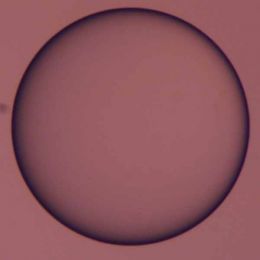 Polystyrene Beads, Large (200-300μm)Catalog Number 19825-1
Polystyrene Beads, Large (200-300μm)Catalog Number 19825-1Our crosslinked Polystyrene Beads are larger than Polybeads®, yet smaller than Polyballs. We offer a full size range of polystyrene beads and can offer particles of intermediate sizes on a custom basis.
200-300µm
-
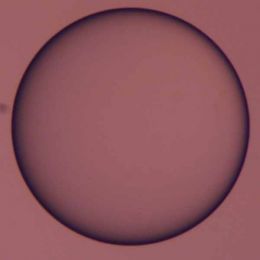 Polystyrene Beads, Large (355-425μm)Catalog Number 19826-1
Polystyrene Beads, Large (355-425μm)Catalog Number 19826-1Our crosslinked Polystyrene Beads are larger than Polybeads®, yet smaller than Polyballs. We offer a full size range of polystyrene beads and can offer particles of intermediate sizes on a custom basis.
355-425µm
-
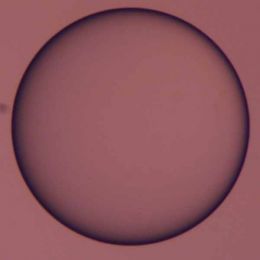 Polystyrene Beads, Large (500-600μm)Catalog Number 21392-1
Polystyrene Beads, Large (500-600μm)Catalog Number 21392-1Our crosslinked Polystyrene Beads are larger than Polybeads®, yet smaller than Polyballs. We offer a full size range of polystyrene beads and can offer particles of intermediate sizes on a custom basis.
500-600µm
-
 Polyballs - Polystyrene 1/8” Diameter, Etched SurfaceCatalog Number 17175
Polyballs - Polystyrene 1/8” Diameter, Etched SurfaceCatalog Number 17175Highly uniform 1/8" polystyrene spheres with an etched surface. The surface roughness of 100-120µm promotes better adherence of proteins, etc. for biological applications.
Density = ~1.05 g/cc
-
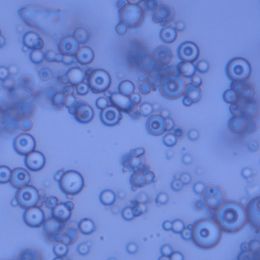 Glass Beads (250-300μm)Catalog Number 18903
Glass Beads (250-300μm)Catalog Number 18903Polysciences has a full size range of glass beads that are manufactured from specially selected soda lime glass with a density of ~2.48.
250-300µm
-
 Microdispers-200Catalog Number 24333
Microdispers-200Catalog Number 24333These particles require far less added dispersant than traditional PTFE particles to form stable dispersions.
Microdispers particles are useful for many applications including coatings, gloss reducers, and coating additives that impact water pickup or surface energy.
With good powder flow properties, these particles are easily compounded in a number of thermoplastic matrices with appropriate heat/shear mixing.
-
 Microdispers-3000Catalog Number 24334
Microdispers-3000Catalog Number 24334These particles require far less added dispersant than traditional PTFE particles to form stable dispersions.
Microdispers particles are useful for many applications including coatings, gloss reducers, and coating additives that impact water pickup or surface energy.
With good powder flow properties, these particles are easily compounded in a number of thermoplastic matrices with appropriate heat/shear mixing.
Mean Particle Size: 3000nm (<10% of particle size distribution is above 10μm)
Surfactant Demand: Lower than traditional PTFE particles
Surface Area: 2m2/g (BET surface area measurement)
-
 Polyballs - Polystyrene, 1/4” Diameter, Etched SurfaceCatalog Number 16730
Polyballs - Polystyrene, 1/4” Diameter, Etched SurfaceCatalog Number 16730Highly uniform 1/4" polystyrene spheres with an etched surface. The surface roughness of 100-120µm promotes better adherence of proteins, etc. for biological applications.
Density = ~1.05 g/cc
-
 Polystyrene Beads, Large (200-300μm)Catalog Number 19825
Polystyrene Beads, Large (200-300μm)Catalog Number 19825Our crosslinked Polystyrene Beads are larger than Polybeads®, yet smaller than Polyballs. We offer a full size range of polystyrene beads and can offer particles of intermediate sizes on a custom basis.
200-300µm
-
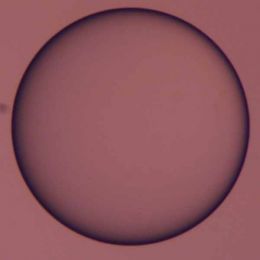 Polystyrene Beads, Large (355-425μm)Catalog Number 19826
Polystyrene Beads, Large (355-425μm)Catalog Number 19826Our crosslinked Polystyrene Beads are larger than Polybeads®, yet smaller than Polyballs. We offer a full size range of polystyrene beads and can offer particles of intermediate sizes on a custom basis.
355-425µm
-
 Polystyrene Beads, Large (500-600μm)Catalog Number 21392
Polystyrene Beads, Large (500-600μm)Catalog Number 21392Our crosslinked Polystyrene Beads are larger than Polybeads®, yet smaller than Polyballs. We offer a full size range of polystyrene beads and can offer particles of intermediate sizes on a custom basis.
500-600µm
-
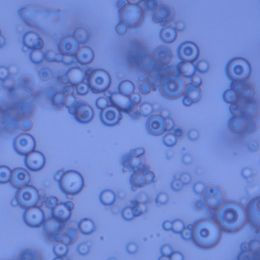 Glass Beads (150-210μm)Catalog Number 05483
Glass Beads (150-210μm)Catalog Number 05483Polysciences has a full size range of glass beads that are manufactured from specially selected soda lime glass with a density of ~2.48.
150-210μm
-
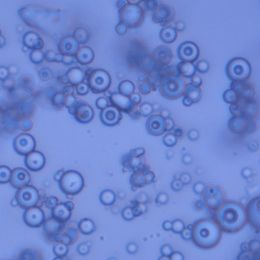 Glass Beads (10-30μm)Catalog Number 07668
Glass Beads (10-30μm)Catalog Number 07668Polysciences has a full size range of glass beads that are manufactured from specially selected soda lime glass with a density of ~2.48.
10-30µm
-
 Glass Beads (50-100μm)Catalog Number 15926
Glass Beads (50-100μm)Catalog Number 15926Polysciences has a full size range of glass beads that are manufactured from specially selected soda lime glass with a density of ~2.48.
50-100µm
-
 Glass Beads (105-150μm)Catalog Number 15927
Glass Beads (105-150μm)Catalog Number 15927Polysciences has a full size range of glass beads that are manufactured from specially selected soda lime glass with a density of ~2.48.
105-150µm
-
 Glass Beads (30-50μm)Catalog Number 18901
Glass Beads (30-50μm)Catalog Number 18901Polysciences has a full size range of glass beads that are manufactured from specially selected soda lime glass with a density of ~2.48.
30-50µm
-
 Glass Beads (210-250μm)Catalog Number 18902
Glass Beads (210-250μm)Catalog Number 18902Polysciences has a full size range of glass beads that are manufactured from specially selected soda lime glass with a density of ~2.48.
210-250µm
-
 Glass Beads (355-420μm)Catalog Number 18905
Glass Beads (355-420μm)Catalog Number 18905Polysciences has a full size range of glass beads that are manufactured from specially selected soda lime glass with a density of ~2.48.
355-420µm
-
 Glass Beads (420-500μm)Catalog Number 18906
Glass Beads (420-500μm)Catalog Number 18906Polysciences has a full size range of glass beads that are manufactured from specially selected soda lime glass with a density of ~2.48.
420-500µm
-
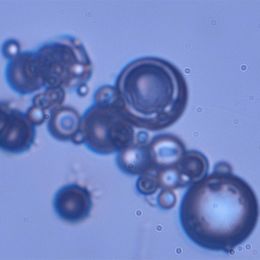 Glass Beads, HollowCatalog Number 19823
Glass Beads, HollowCatalog Number 19823Polysciences’ hollow glass beads offer the strength and stability of glass at 1.1 g/cc nominal density.
2-20µm
-
 Glass Beads (500-850μm)Catalog Number 17596
Glass Beads (500-850μm)Catalog Number 17596Polysciences has a full size range of glass beads that are manufactured from specially selected soda lime glass with a density of ~2.48.
500-850μm
-
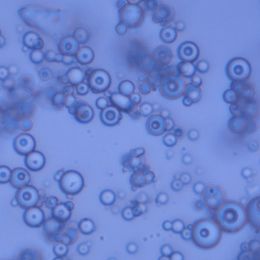 Glass Beads (3-10μm)Catalog Number 07666
Glass Beads (3-10μm)Catalog Number 07666Manufactured from specially selected borosilicate with a density of ~2.5 g/cm3.
-
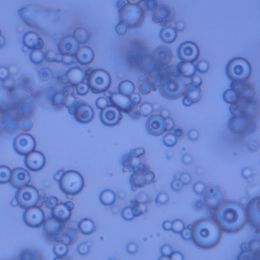 Glass Beads, AmineCatalog Number 23584
Glass Beads, AmineCatalog Number 23584These are high surface area soda lime glass beads which have been functionalized by reaction with the appropriate organosilane. They are capable of coupling with peptides, dyes, and other compounds, the amine-functional beads as supplied and the glycidyl-functional beads after periodate oxidation. Additional sizes are available on a custom basis.
30-50μm
-
 Glass Beads, GlycidylCatalog Number 23585
Glass Beads, GlycidylCatalog Number 23585These are high surface area soda lime glass beads which have been functionalized by reaction with the appropriate organosilane. They are capable of coupling with peptides, dyes, and other compounds, the amine-functional beads as supplied and the glycidyl-functional beads after periodate oxidation. Additional sizes are available on a custom basis.
30-50μm
-
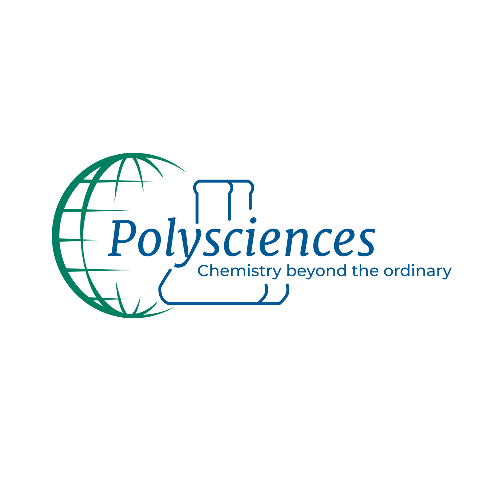 Spherical Ferromagnetic Iron Powder, 2-3μmCatalog Number 19844
Spherical Ferromagnetic Iron Powder, 2-3μmCatalog Number 19844Spherical Iron Powder
2-3µm -
 Red Iron Oxide Particles, 0.3-0.8μmCatalog Number 07674
Red Iron Oxide Particles, 0.3-0.8μmCatalog Number 07674Red Iron Oxide Particles, 0.3-0.8µm
-
 Microdispers-8000Catalog Number 24336
Microdispers-8000Catalog Number 24336Polytetrafluoroethylene (PTFE) particles provided in dry powder form. These particles require far less added dispersant than traditional PTFE particles to form stable dispersions.
-
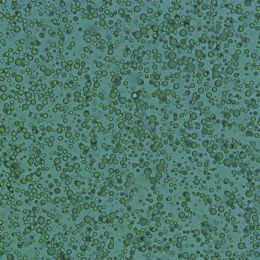 Polybead® Poly(methyl methacrylate) Microspheres - Broad DistributionCatalog Number 19130
Polybead® Poly(methyl methacrylate) Microspheres - Broad DistributionCatalog Number 19130Poly(methyl methacrylate) or PMMA is less hydrophobic than polystyrene and should show reduced nonspecific protein and peptide binding. The density of these beads, 1.19 g/cc, is considerably higher than that of polystyrene beads, making them easier to concentrate by centrifugation. The beads are not free of surfactant and contain surface carboxylic acid groups at higher concentration than the standard Polybead Polystyrene Carboxylate Microspheres.
-
 Polybead® Poly(methyl methacrylate) Microspheres with Anionic SurfactantCatalog Number 23570
Polybead® Poly(methyl methacrylate) Microspheres with Anionic SurfactantCatalog Number 23570Poly(methyl methacrylate) or PMMA is less hydrophobic than polystyrene and should show reduced nonspecific protein and peptide binding. The density of these beads, 1.19 g/cc, is considerably higher than that of polystyrene beads, making them easier to concentrate by centrifugation. The beads are not free of surfactant and contain surface carboxylic acid groups at higher concentration than the standard Polybead Polystyrene Carboxylate Microspheres.
-
 Phenolic Beads, HollowCatalog Number 17806
Phenolic Beads, HollowCatalog Number 17806In many uses of liquid resins, it is desirable to reduce the weight of the finished product. One way to reduce the weight below the original resin weight is to incorporate a suitable additive. Hollow phenolic microspheres are excellent for use in a variety of industrial applications. They are lightweight, chemically inert, and mechanically strong. They can be excellent adhesives, gap filling formulations, sandable putties, syntactic foams, and molded and laminated structures that must be lightweight and strong. About 30% by weight will make most resins unpourable. Filling casting are quite machinable; turns casting brown.
-
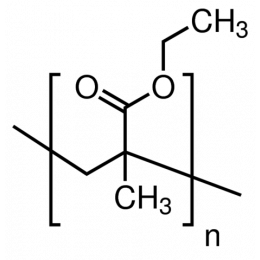 Poly(ethyl methacrylate) Beads (PEMA Beads)Catalog Number 03197
Poly(ethyl methacrylate) Beads (PEMA Beads)Catalog Number 03197Tough methacrylate resin.
Particle size (D50): 140-220µm
-
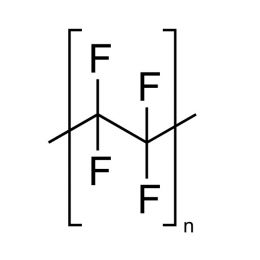 Poly(tetrafluoroethylene) (Teflon™ 7A)Catalog Number 08816
Poly(tetrafluoroethylene) (Teflon™ 7A)Catalog Number 08816Inert polymer.
Nominal diameter: 35µm
-
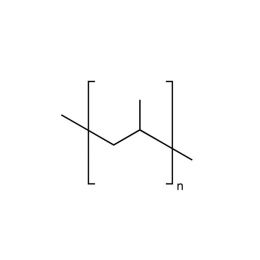 Polypropylene, Chromatographic GradeCatalog Number 04342
Polypropylene, Chromatographic GradeCatalog Number 04342Widely used polyolefin. Soluble in: chlorinated hydrocarbons, aromatic hydrocarbons, isoamyl acetate.
Chromatographic grade 25-85µm
-
 Polybead® Poly(methyl methacrylate) Microspheres - MonodisperseCatalog Number 12083
Polybead® Poly(methyl methacrylate) Microspheres - MonodisperseCatalog Number 12083Poly(methyl methacrylate) or PMMA is less hydrophobic than polystyrene and should show reduced nonspecific protein and peptide binding. The density of these beads, 1.19 g/cc, is considerably higher than that of polystyrene beads, making them easier to concentrate by centrifugation. The beads are not free of surfactant and contain surface carboxylic acid groups at higher concentration than the standard Polybead Polystyrene Carboxylate Microspheres.
-
 Polybead® Crosslinked Melamine ParticlesCatalog Number 23579
Polybead® Crosslinked Melamine ParticlesCatalog Number 23579These melamine particles are crosslinked by acid-catalyzed reaction with formaldehyde. The particles have a much higher density (1.51 g/cc) than polystyrene, are hydrophilic with amine and methylolamine groups, and, being crosslinked, are not noticeably swelled by organic solvents. The particles can be lyophilized and then redispersed in water. The particles are supplied as a suspension of 2.5% solids in water.
~1.00µm
-
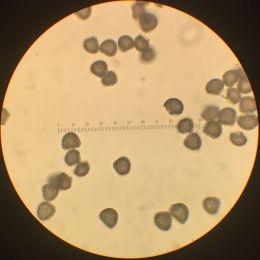 LycopodiumCatalog Number 16867
LycopodiumCatalog Number 16867Natural biological particles
28µm
-
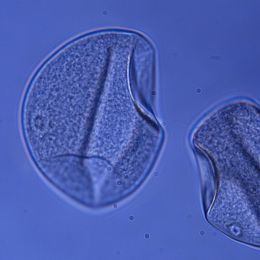 Corn PollenCatalog Number 07664
Corn PollenCatalog Number 0766485-90µm
-
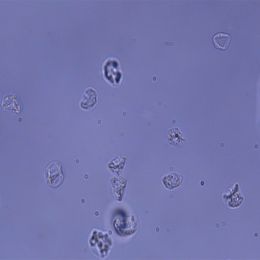 Paper Mulberry PollenCatalog Number 07670
Paper Mulberry PollenCatalog Number 0767012-13µm
-
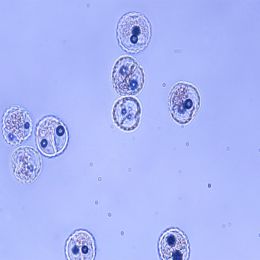 Ragweed PollenCatalog Number 07673
Ragweed PollenCatalog Number 07673This 19-20µm size ragweed pollen is a short type, botanical named Ambrosia artemisiifolia.
It is collected under a vacuum method and exceeds identity and purity by microscopic identification. It contains less than 0.1% contamination with foreign pollens or molds. Plant parts do not exceed 5% for anemophilous (wind pollinated) pollen or 12% for entomophilous (insect pollinated) pollen.
19-20µm
-
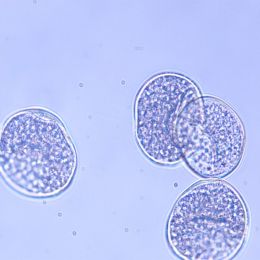 Pecan PollenCatalog Number 07671
Pecan PollenCatalog Number 0767145-52µm
-
 Polyballs - Polypropylene, 1/4” DiameterCatalog Number 16026
Polyballs - Polypropylene, 1/4” DiameterCatalog Number 16026Highly uniform 1/4" polypropylene spheres with a smooth surface.
Density = ~0.92 g/cc
-
 Polyballs - Polyamide 6/6 (Nylon), 1/16" DiameterCatalog Number 08295
Polyballs - Polyamide 6/6 (Nylon), 1/16" DiameterCatalog Number 08295Highly uniform 1/16" polyamide (6/6 nylon) spheres with a smooth surface.
Density = ~1.19 g/cc
-
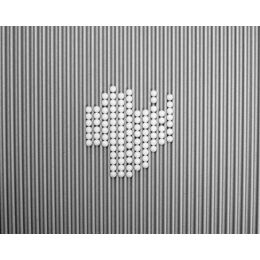 Polyballs - Teflon, 1/8” DiameterCatalog Number 17649
Polyballs - Teflon, 1/8” DiameterCatalog Number 17649Highly uniform 1/8" Teflon® PTFE spheres with a smooth surface (chemically resistant).
Density = ~2.14 g/cc
-
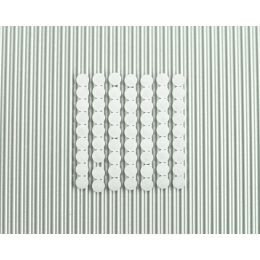 Polyballs - Polystyrene, 1/4” Diameter, for Biological ApplicationsCatalog Number 18548
Polyballs - Polystyrene, 1/4” Diameter, for Biological ApplicationsCatalog Number 18548Highly uniform 1/4" polystyrene spheres with an etched surface. The surface roughness of 100-120µm promotes better adherence of proteins, etc. for biological applications.
Density = ~1.05 g/cc
-
 Polyballs - Polyethylene, 3/8” Diameter, HollowCatalog Number 19529
Polyballs - Polyethylene, 3/8” Diameter, HollowCatalog Number 19529Highly uniform 3/8" hollow polyethylene spheres with a smooth surface.
Density = ~0.53 g/cc
-
 Polyballs - Polystyrene, 1/8” Diameter, for Biological ApplicationsCatalog Number 18547
Polyballs - Polystyrene, 1/8” Diameter, for Biological ApplicationsCatalog Number 18547Highly uniform 1/8" polystyrene spheres with an etched surface. The surface roughness of 100-120µm promotes better adherence of proteins, etc. for biological applications.
Density = ~1.05 g/cc
-
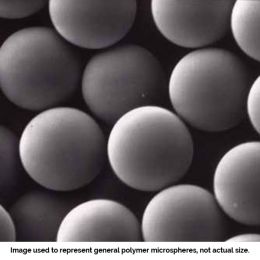 Polyballs - Polystyrene, 1/4” DiameterCatalog Number 19827
Polyballs - Polystyrene, 1/4” DiameterCatalog Number 19827Highly uniform 1/4" polystyrene spheres with a smooth surface.
Density = ~1.05 g/cc
-
 Polyballs - Teflon, 1/4” DiameterCatalog Number 17650
Polyballs - Teflon, 1/4” DiameterCatalog Number 17650Highly uniform 1/4" Teflon® PTFE spheres with a smooth surface (chemically resistant).
Density = ~2.14 g/cc
-
 Polyballs, Modified - Polystyrene 1/4” Diameter, CarboxylateCatalog Number 19840
Polyballs, Modified - Polystyrene 1/4” Diameter, CarboxylateCatalog Number 19840Highly uniform 1/4" carboxylate-modified polystyrene spheres with an etched surface (surface roughness of 100-120µm). Biomolecules may be conjugated to surface carboxylate groups via an EDAC-mediated chemistry.
Density = ~1.05 g/cc
-
 Polyballs, Modified - Polystyrene 1/8” Diameter, CarboxylateCatalog Number 19841
Polyballs, Modified - Polystyrene 1/8” Diameter, CarboxylateCatalog Number 19841Highly uniform 1/8" carboxylate-modified polystyrene spheres with an etched surface (surface roughness of 100-120µm). Biomolecules may be conjugated to surface carboxylate groups via an EDAC-mediated chemistry.
Density = ~1.05 g/cc
-
 Polyballs, Modified - Polystyrene 1/4” Diameter, Blue DyedCatalog Number 19842
Polyballs, Modified - Polystyrene 1/4” Diameter, Blue DyedCatalog Number 19842Highly uniform 1/4" Blue Dyed Polyballs are easy to visualize and feature surface amine groups that can be used for glutaraldehyde-mediated conjugation of biomolecules. These spheres also have an etched surface with a surface roughness of 100-120µm.
Density = ~1.05 g/cc
-
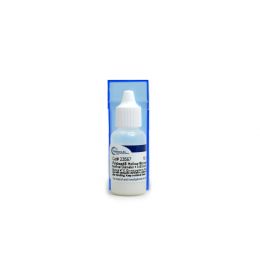 Polybead® Hollow Microspheres (0.40μm)Catalog Number 23567
Polybead® Hollow Microspheres (0.40μm)Catalog Number 23567The biomedical advantages of a polystyrene surface are combined with a low effective density in a new class of microspheres. Polybead® Hollow Microspheres are spherical styrene / acrylic beads supplied in suspension. A relatively dense shell of a polystyrene based copolymer is formed around a void in the particle. Sphere voids are water-filled in the as-supplied 5% aqueous suspension, and the water-filled particle will have an effective density near 1.0 g/cm3. Water is lost from the void upon drying as the particles are slightly porous. This results in a hollow particle with a shell approximately 0.10µm thick. Surfactants on the surface of the spheres help stabilize the particles.
-
 Polybead® Hollow Microspheres (0.55μm)Catalog Number 23568
Polybead® Hollow Microspheres (0.55μm)Catalog Number 23568The biomedical advantages of a polystyrene surface are combined with a low effective density in a new class of microspheres. Polybead® Hollow Microspheres are spherical styrene / acrylic beads supplied in suspension. A relatively dense shell of a polystyrene based copolymer is formed around a void in the particle. Sphere voids are water-filled in the as-supplied 5% aqueous suspension, and the water-filled particle will have an effective density near 1.0 g/cm3. Water is lost from the void upon drying as the particles are slightly porous. This results in a hollow particle with a shell approximately 0.10µm thick. Surfactants on the surface of the spheres help stabilize the particles.
-
 Polybead® Hollow Microspheres (1.00μm)Catalog Number 23569
Polybead® Hollow Microspheres (1.00μm)Catalog Number 23569The biomedical advantages of a polystyrene surface are combined with a low effective density in a new class of microspheres. Polybead® Hollow Microspheres are spherical styrene / acrylic beads supplied in suspension. A relatively dense shell of a polystyrene based copolymer is formed around a void in the particle. Sphere voids are water-filled in the as-supplied 5% aqueous suspension, and the water-filled particle will have an effective density near 1.0 g/cm3. Water is lost from the void upon drying as the particles are slightly porous. This results in a hollow particle with a shell approximately 0.10µm thick. Surfactants on the surface of the spheres help stabilize the particles.
Additional Microspheres & Particles
